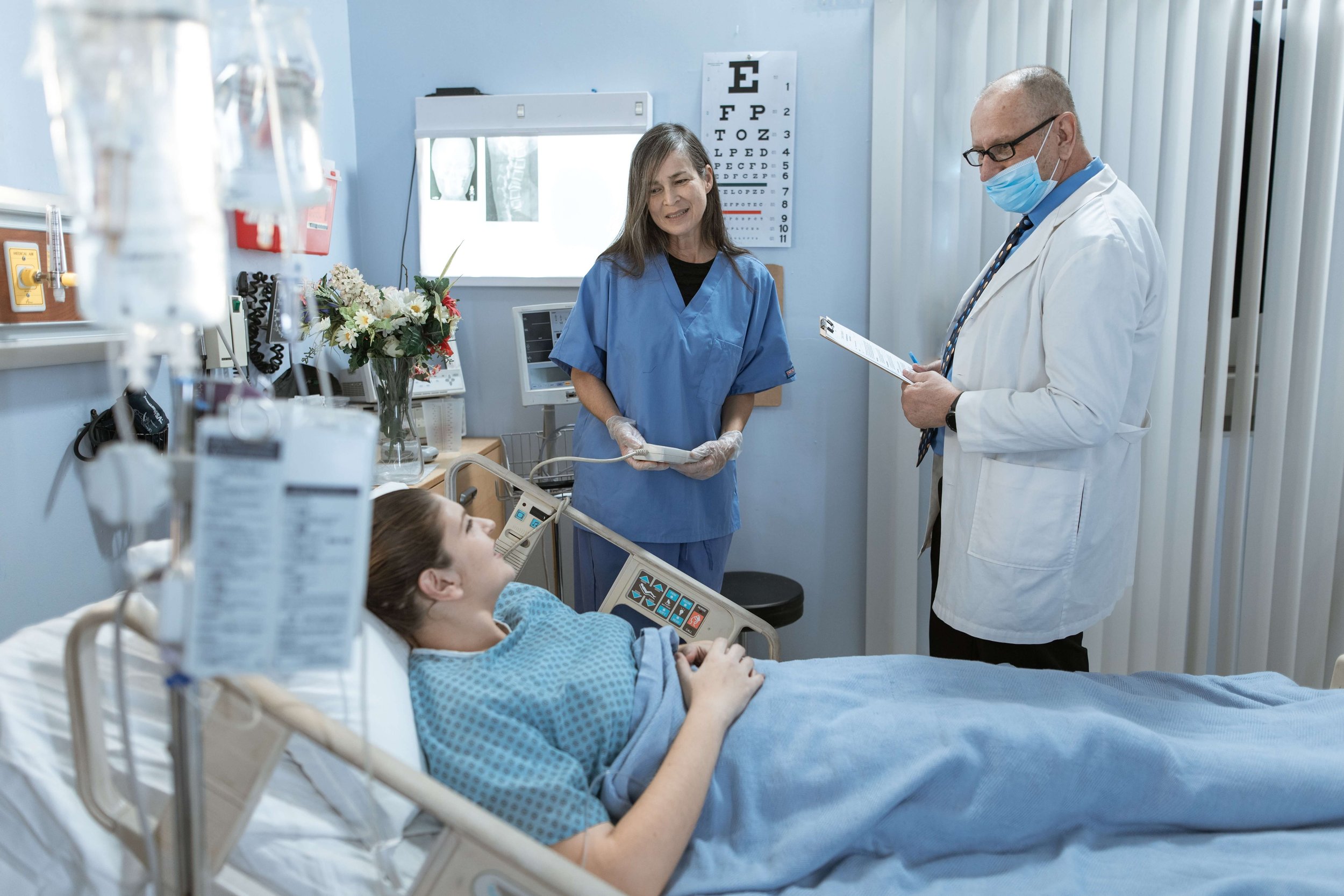Should I Become an LPN or a CNA?
Both licensed practical nurses (LPNs) and certified nursing assistants (CNAs) play an essential role in nursing care. The difference between the two is generally in the type of healthcare that they provide. To put it simply, CNAs assist patients with daily functions like eating and bathing. LPNs, on the other hand, perform basic nursing functions such as updating patients’ health records, administering medication, and assisting nurses. CNAs and LPNs must pass certification examinations; however, only LPNs are licensed nurses.
If you are having difficulty choosing between an LPN or CNA, this article will help you understand the difference between the two positions, as well as their job responsibilities, education requirements, job outlook, and salary. So, let’s get started!
What Is a Licensed Practical Nurse (LPN)?
Licensed practical nurses (LPN) are called licensed vocational nurses (LVN) in California and Texas, but both titles refer to the same job. LPNs or LVNs are in demand across various settings such as hospitals, hospices, or even colleges.
A licensed practical nurse (LPN) offers primary nursing care to patients in a medical or home environment; they are part of a healthcare team and work under the supervision of a registered nurse or other supervisors.
Interested in pursuing an LVN degree in California?
Fill out the form and get all the detailed information you need regarding your chosen program.
What does an LPN do?
LPNs perform some of the duties of CNAs, as well as more advanced and delicate patient care. The main responsibilities of an LPN include:
Primary medical and patient care
Recording patient histories
Checking for and recording vital signs
Inserting patient catheters
Changing bedpans and bandages
Prioritizing patient’s comfort and helping with the activities of daily living
Discussing treatment and healthcare plans with patients and their families
Reporting patient information to registered nurses (RNs), doctors, or senior medical consultants
Assisting with tests or other procedures
Doing some administrative work depending on the facility
LPN school requirements
An LPN education program takes about one to two years to complete on average. After completion of the program, graduates have to sit for the NCLEX-PN licensure exam. You can also advance your career and earn an RN qualification if you want.
What is the fastest way to become an LPN?
The fastest way to become an LPN is to complete a vocational school diploma program. You will be able to work in months, and you will qualify for the same professional credentials as students completing degree programs.
LPN skills
The following are examples of some of the vital skills that an LPN should possess:
Basic nursing skills needed to handle different medical scenarios such as performing routine assessments and simple procedures, changing bandages, assisting with checkups and emergency care when necessary and so on.
Enough energy to withstand long days of physical activity, especially during long, busy nursing shifts or even emergencies.
Attention to detail and precision can help LPNs ensure patient safety and the best possible care.
Show empathy towards the patient and their family members in order to connect, build trust and offer comfort during challenging circumstances.
Clear, concise communication and active listening skills to make sure that important information transfers accurately and efficiently.
LPN job outlook
According to the U.S Bureau of Labor Statistics (BLS), the demand for LPNs is expected to grow 9% from 2020 to 2030, about as fast as the average for all occupations. An LPN is able to work in a variety of healthcare settings, and the demand for LPNs is seeing a rise, especially in home health and residential care facilities.
LPN salary
According to BLS, the median pay for an LPN or LVN is $48,820 per year or $23.47 per hour. LPN salaries may vary slightly depending on the sector (hospital, education, government, and so on) and your years of experience.
What Is a Certified Nursing Assistant (CNA)?
A CNA or a certified nurse assistant is an entry-level healthcare professional who offers direct patient care. CNAs work under the supervision of a nurse and perform duties that help patients as well as nurses with daily routines.
So, a CNA has a more limited radius of practice than an LPN, is not authorized to perform the same duties as an LPN, and is not allowed to make any kind of independent decisions. However, their role is essential since they are a patient’s primary caregivers in a long-term facility.
What does a CNA do?
CNAs’ daily responsibilities and duties include the following:
Assisting patients to bathe and dress
Serving meals and helping patients eat
Recording patients’ food and liquid intake
Recording vital signs
Dressing wounds
Assisting with basic medical procedures
Emptying and supplying bedpans
Transferring patients to their wheelchairs, beds, or other places
Repositioning bedridden patients
Cleaning a patient’s living space
Changing sheets
Documenting a patient’s condition
Communicating with patients and their family members about their condition
Collaborating with other caregivers, nurses, and doctors
CNA school requirements
A high school diploma or GED is needed in order to pursue CNA training. You can become a CNA with four to twelve weeks of training, depending on the state’s requirements. But, you will not need a bachelor's degree for this role.
Make sure to look for a school that is approved by your state board and accredited by the Accreditation Commission for Education in Nursing (ACEN) or Commission on Collegiate Nursing Education (CCNE). You can also advance your career later by pursuing an Associate Degree in Nursing (ADN) or Bachelor of Science in Nursing (BSN).
What is the fastest way to become a CNA?
The fastest way to become a CNA is by becoming part of a Consolidated Nurse Aid School. These schools offer fast-track certification options with small class sizes. Training to become a CNA can take as little as three weeks to complete at a consolidated nurse aid school.
CNA skills
If you are interested in a career as a CNA, you will need a multitude of skills. Here are the most important qualities of a successful certified nursing assistant:
Strong attention to detail since they work daily with data, patient charts, and forms containing important health information, they also need to pay attention to their patients’ nonverbal cues and look out for any physical or mental changes.
Excellent communication skills to know how and when to communicate effectively and accurately with doctors, nurses, patients, and their families
CNAs must have knowledge of medical terminology in order to communicate efficiently with other healthcare workers.
Patience, calmness, and empathy are necessary in order to provide the best possible care.
CNAs may be asked to work weekend shifts, switch shifts, or longer shifts, so they need to remain flexible, professional, and on-task no matter what.
Enthusiasm and optimism are also important to show when running into difficult or negative situations; that will radiate to patients and coworkers, thus fostering a happier work environment.
CNA job outlook
According to the U.S Bureau of Labor Statistics, certified nursing assistants will also see job growth, with a projected 8% increase in job opportunities from 2020 to 2030, about as fast as average.
CNA salary
Because a CNA has less training and responsibilities than an LPN, they earn a lower median salary. The median wage for a CNA is $30,830 per year or $14.82 per hour, as reported by the U.S Bureau of Labor Statistics.
Should I Become a CNA Before an LPN?
No state requires an individual to be a CNA before entering an LPN program. But, some LPN programs actually require or strongly recommend that you possess a CNA certificate before you enter the program.
Becoming a CNA beforehand will give you the experience and skills that you will most likely need when working as an LPN. Plus, you will have a job to support yourself while studying for becoming a licensed practical nurse.
Conclusion
As you can see, there are many similarities and differences between an LPN and CNA. Hopefully, learning more about these differences will help you choose the option that best suits your needs and aspirations. So, take the time to thoroughly explore your options and find the most appropriate path for you. And remember, any type of nursing occupation can develop into a rewarding career.

